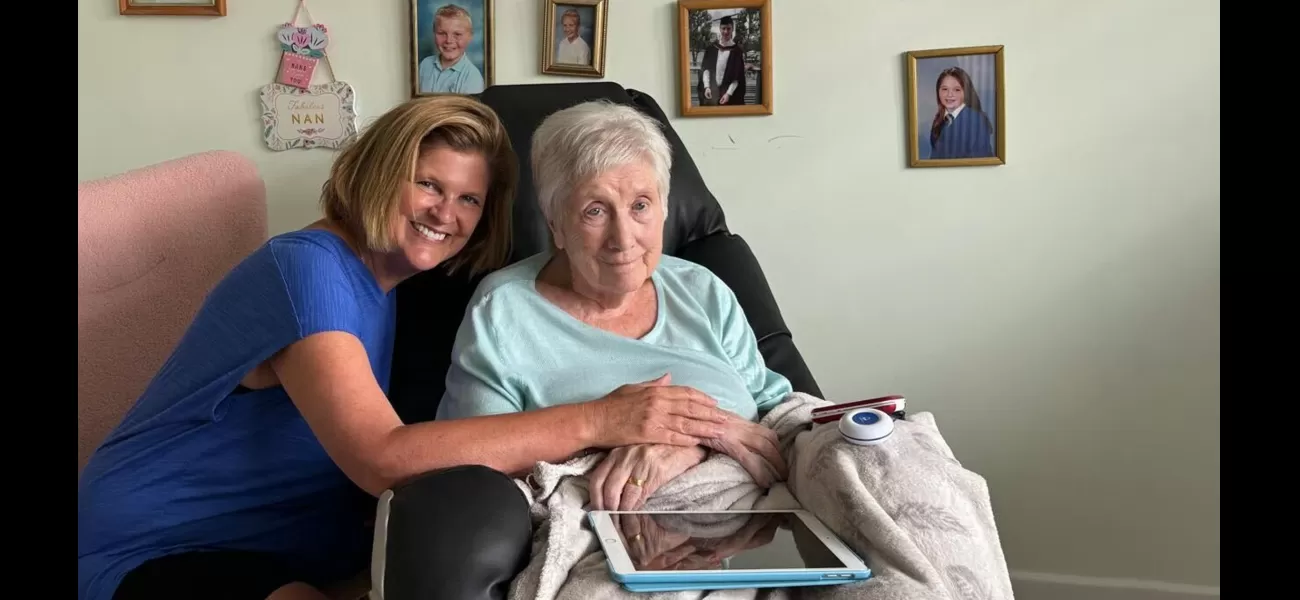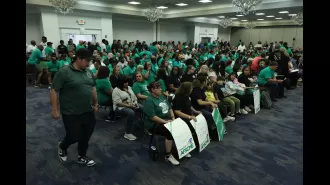Technology has helped my 89-year-old mother with dementia to remember names better than ever before.
Many caregivers struggle with utilizing technology, with 40% having no knowledge on how to effectively use it.
July 6th 2024.

Rachel Haworth is a loving daughter from Southampton who has dedicated her life to caring for others. With her professional background as a carer, she knew that one day she would have to take on the responsibility of caring for her own mother, Brenda, who was diagnosed with a form of dementia. In 2020, after the loss of her husband Gerry, Brenda was diagnosed with vascular dementia. This condition, caused by a blockage or injury to blood vessels in the brain, can lead to memory problems, confusion, and difficulty with daily tasks.
Despite the challenges, Rachel has found ways to improve her mother's quality of life through modern technology. She has seen a remarkable change in her mother over the past year, thanks to tools like tablets. Brenda is now able to keep up with current events and remember names, something she struggled with just a year ago.
Rachel is not alone in her belief that technology can enhance the lives of those living with dementia. According to a recent study by BT Group, two-thirds of caregivers share this belief. From setting reminders for medication to playing soothing music, smartphones have become an essential tool for caregivers. Rachel's family has fully embraced technology and uses it for everything from scheduling appointments to staying in touch with her mother's care team.
But not all caregivers feel comfortable using technology. In fact, the study found that many caregivers lack the necessary skills and training to utilize technology effectively. To address this issue, BT Group is partnering with the charity AbilityNet to host a free webinar. This webinar aims to educate caregivers on available resources and empower them with the knowledge and tools they need to care for their loved ones.
For Rachel, technology has been a game-changer in her mother's care. Brenda now enjoys playing games on her tablet, which not only helps her mind stay active but also allows her to connect with her grandchildren through messaging. This is just one example of how technology can improve the lives of those with dementia.
As the number of people living with dementia continues to rise, technology has the potential to make a significant impact. Experts estimate that by 2040, there will be over 1.7 million people with the condition in Britain. This is not due to a lack of effective treatments or preventive strategies, but rather the fact that people are living longer. That's why it's crucial for caregivers to embrace technology and all the ways it can support and improve the lives of those with dementia.
Rachel knows firsthand the positive impact technology can have on those with dementia. She has seen her mother's condition improve since incorporating technology into her daily routine. For Rachel, it's not just about convenience, but also about preserving her mother's independence and dignity. Technology has given Brenda a sense of empowerment and connection that was once thought impossible.
In the end, it's all about finding ways to make life a little easier for those with dementia and their caregivers. With the help of technology and resources like the upcoming webinar, caregivers can feel more confident and equipped to provide the best care possible for their loved ones. As Rachel says, "Embracing technology isn't just about convenience; it's about preserving independence and dignity."
Despite the challenges, Rachel has found ways to improve her mother's quality of life through modern technology. She has seen a remarkable change in her mother over the past year, thanks to tools like tablets. Brenda is now able to keep up with current events and remember names, something she struggled with just a year ago.
Rachel is not alone in her belief that technology can enhance the lives of those living with dementia. According to a recent study by BT Group, two-thirds of caregivers share this belief. From setting reminders for medication to playing soothing music, smartphones have become an essential tool for caregivers. Rachel's family has fully embraced technology and uses it for everything from scheduling appointments to staying in touch with her mother's care team.
But not all caregivers feel comfortable using technology. In fact, the study found that many caregivers lack the necessary skills and training to utilize technology effectively. To address this issue, BT Group is partnering with the charity AbilityNet to host a free webinar. This webinar aims to educate caregivers on available resources and empower them with the knowledge and tools they need to care for their loved ones.
For Rachel, technology has been a game-changer in her mother's care. Brenda now enjoys playing games on her tablet, which not only helps her mind stay active but also allows her to connect with her grandchildren through messaging. This is just one example of how technology can improve the lives of those with dementia.
As the number of people living with dementia continues to rise, technology has the potential to make a significant impact. Experts estimate that by 2040, there will be over 1.7 million people with the condition in Britain. This is not due to a lack of effective treatments or preventive strategies, but rather the fact that people are living longer. That's why it's crucial for caregivers to embrace technology and all the ways it can support and improve the lives of those with dementia.
Rachel knows firsthand the positive impact technology can have on those with dementia. She has seen her mother's condition improve since incorporating technology into her daily routine. For Rachel, it's not just about convenience, but also about preserving her mother's independence and dignity. Technology has given Brenda a sense of empowerment and connection that was once thought impossible.
In the end, it's all about finding ways to make life a little easier for those with dementia and their caregivers. With the help of technology and resources like the upcoming webinar, caregivers can feel more confident and equipped to provide the best care possible for their loved ones. As Rachel says, "Embracing technology isn't just about convenience; it's about preserving independence and dignity."
[This article has been trending online recently and has been generated with AI. Your feed is customized.]
[Generative AI is experimental.]
0
0
Submit Comment





